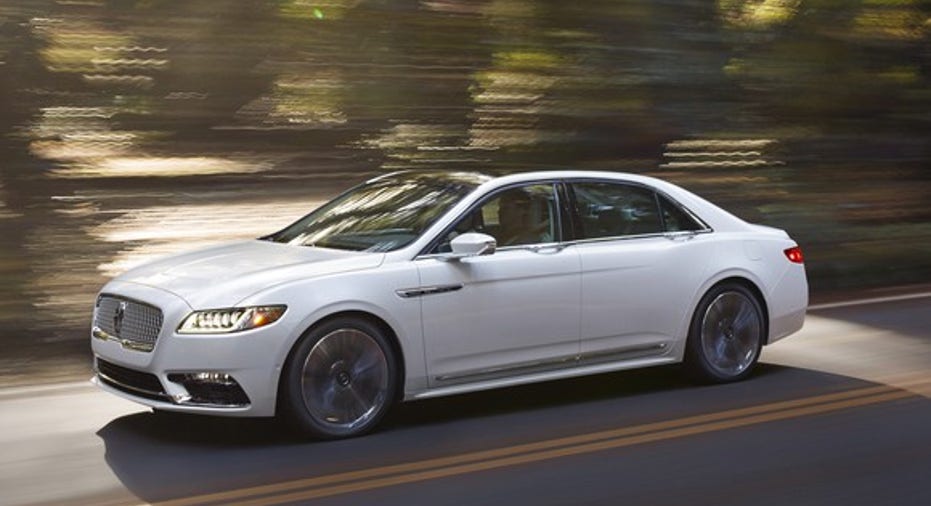Ford's Sales Slipped Again, but Profitable Trends Remain Intact

The first of Ford's all-new 2017 Super Duty pickups are selling very quickly, and at very strong prices. Image source: Ford Motor Company.
Ford Motor Company (NYSE: F) said that its U.S. sales fell 8% in September, as an expected year-over-year drop in rental-fleet deliveries exacerbated a 4% decline in retail sales.
By the numbers: Trucks still strong. Cars -- not so much
Ford's result was in line with estimates by analysts, who had foreseen a significant year-over-year drop for two reasons. First, Ford's sales to rental-car fleets were elevated in late 2015 and early 2016, and the company had said that it expected lower rental-fleet sales through the remainder of this year. Second, September 2015 was a terrific month for Ford's U.S. sales: It's a tough comp.
In that light, Ford's sales totals aren't quite as worrisome as the headline number might suggest, particularly with respect to its profit powerhouse, full-size pickups. Sales of Ford's F-Series pickups were down 2.6% from a tremendous year-ago result, but still very strong at 67,809 sold.
SUVs were more of a mixed bag. Sales of Ford-brand SUVs were down 3.2% as a group, with the Escape and Explorer both down about 12%. But Ford sales chief Mark LaNeve noted that the average transaction price (ATP) for the Escape rose $500 in September, while the ATPs for the compact SUV segment as a whole were down $360. He attributed the Escape's pricing strength to a strong "mix" of well-optioned 2017 models.
Like most rivals, Ford's sedan models have had a tough 2016. Sales for the group were down 22.5% in September, with all models suffering double-digit percentage declines. The drop in rental-fleet sales has hurt totals for models like the Fusion, which continues to do well at retail; but overall, the group is suffering from an ongoing market shift away from sedans and toward trucks and SUVs.
The all-new 2017 Lincoln Continental sedan has also begun arriving at dealers. Image source: Ford Motor Company.
On a somewhat brighter note, U.S. sales at Ford's luxury Lincoln brand were up 1.3% in September, as Ford's effort to revitalize the old brand continues to make slow progress. The midsize MKX crossover SUV was the star, with sales up 8.7%. Also helping: The first examples of the all-new Lincoln Continental began arriving at dealers in September -- 775 of the big sedans were sold last month.
What it means for Ford and its investors
For Ford investors, there are a few pieces (relatively) of good news in the September sales report.
First, the growth in Ford's overall average transaction price continues to outpace that of the industry. Ford's ATP rose $1,100 in September from a year ago, versus a $400 gain for the overall industry, the company said.
Second, Ford's use of incentives remains under control. TrueCar estimates that Ford's per-vehicle incentive spending as a percentage of ATP was 11.7% in September. That's up from 10.5% a year ago, but at the same level we saw in August. Among pickup competitors, General Motors' (NYSE: GM) spending was comparable at 11.3% of its ATP, while Fiat Chrysler Automobiles' (NYSE: FCAU) was significantly higher at 13%.
Third, Ford's latest new product is showing early signs of being a highly profitable hit. Inventories of its all-new 2017 Super Duty pickups are still building, but the trucks are spending an average of just 13 days on dealer lots (anything under 30 days is a very quick sales pace). Better yet, LaNeve noted that retail buyers are choosing highly optioned models; the 2017 Super Duty's ATP in September was a whopping $62,000, he said.
The upshot: Trends still suggest a profitable quarter
Ford has warned that its profits will dip because of increased spending. But even with overall sales down somewhat, the trends in its U.S. sales numbers suggest that -- at least in North America -- the Blue Oval is still on track for good profit margins.
A secret billion-dollar stock opportunity The world's biggest tech company forgot to show you something, but a few Wall Street analysts and the Fool didn't miss a beat: There's a small company that's powering their brand-new gadgets and the coming revolution in technology. And we think its stock price has nearly unlimited room to run for early in-the-know investors! To be one of them, just click here.
John Rosevear owns shares of Ford and General Motors. The Motley Fool owns shares of and recommends Ford. The Motley Fool recommends General Motors and TrueCar. Try any of our Foolish newsletter services free for 30 days. We Fools may not all hold the same opinions, but we all believe that considering a diverse range of insights makes us better investors. The Motley Fool has a disclosure policy.



















